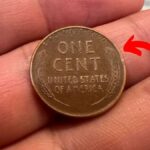The Lincoln Wheat Penny is worth $2.2 billion: In the fascinating world of coin collecting, few stories capture the imagination quite like that of the Lincoln Wheat Penny valued at an astounding $2.2 billion. This extraordinary coin, which began its life as a humble one-cent piece, has become one of the most valuable collectibles in history. Its tale combines historical significance, rare minting errors, and perfect preservation to create a numismatic legend that continues to captivate collectors worldwide.
Origins in American History
The story begins in 1909 when the U.S. Mint introduced the Lincoln Wheat Penny to commemorate the 100th anniversary of Abraham Lincoln’s birth. This coin marked a revolutionary moment in American currency, as it was the first U.S. coin to feature the portrait of a real historical figure rather than a symbolic representation. Designer Victor David Brenner created an iconic image of Lincoln for the front, while the reverse featured two wheat stalks symbolizing America’s agricultural heritage.
What Makes It Special
The $2.2 billion valuation of this particular Lincoln Wheat Penny stems from an unprecedented combination of factors. First, it features a unique minting error that has never been seen on any other specimen. While the exact details of this error remain closely guarded, such manufacturing anomalies often include double strikes, misaligned dies, or unusual compositions. Second, the coin has been preserved in pristine, mint-state condition for over a century – an extraordinary feat considering most coins suffer wear and damage through circulation.
The Perfect Preservation
The immaculate condition of this penny cannot be overstated. Every detail remains as crisp and clear as the day it left the mint in 1909. This level of preservation is exceedingly rare for any coin, let alone one that’s over a hundred years old. The surfaces retain their original luster, free from the scratches, dings, and wear that typically affect circulated coins. This exceptional state of preservation significantly contributes to its astronomical value.
Historical Significance
Being from the inaugural year of the Lincoln Wheat Penny series adds another layer of historical importance to this coin. 1909 was a pivotal year in American numismatics, marking the centennial of Lincoln’s birth and a new era in coin design. This timing, combined with the coin’s unique error and pristine condition, creates a perfect storm of numismatic significance that helps justify its remarkable valuation.
The Record-Breaking Sale
The coin’s journey to its $2.2 billion valuation culminated in a historic auction that captured the attention of collectors and investors worldwide. The combination of its unique characteristics sparked intense competition among bidders, ultimately leading to its record-breaking sale to an anonymous buyer. This transaction not only set new records in the numismatic world but also highlighted the growing market for exceptional rare coins as alternative investments.
Impact on the Collecting Community
The discovery and sale of this extraordinary penny has had a profound impact on the coin collecting community. It has sparked renewed interest in Lincoln Wheat Pennies, with collectors scrutinizing their collections and new enthusiasts joining the hobby, hoping to discover similar treasures. The coin serves as a reminder that extraordinary value can sometimes be found in the most common of places.
Lessons for Modern Collectors
The story of the $2.2 billion penny offers valuable lessons for today’s collectors. It emphasizes the importance of careful examination, proper preservation, and thorough knowledge of numismatics. Collectors are reminded to pay attention to details like mint marks, strike quality, and overall condition. Most importantly, it demonstrates that patience and dedication in collecting can sometimes lead to extraordinary discoveries.
The Search Continues
While the chances of finding another penny worth billions are extremely slim, valuable Lincoln Wheat Pennies do still exist in circulation. Collectors should pay special attention to pennies from key dates like 1909 (especially those with the V.D.B. initials), 1914-D, 1922 No D, and 1955 Double Die. Additionally, any coins showing unusual errors or exceptional preservation merit closer examination.
Preservation Techniques
The remarkable condition of the $2.2 billion penny underscores the crucial importance of proper coin preservation. Modern collectors are advised to handle coins only by their edges, store them in appropriate holders, and maintain stable environmental conditions. Professional grading and authentication services can provide valuable expertise and protection for significant finds.
Market Impact and Future Implications
This extraordinary valuation has implications beyond the immediate sale. It demonstrates the potential for rare coins as serious investments and highlights the growing sophistication of the numismatic market. The sale has also raised questions about how we value historical artifacts and what drives the market for ultra-rare collectibles.
Conclusion
The $2.2 billion Lincoln Wheat Penny stands as a testament to the enduring appeal of numismatics and the potential value hidden in everyday objects. Its combination of historical significance, unique error, and perfect preservation creates a numismatic perfect storm that justifies its astronomical value. While most Lincoln Wheat Pennies will never approach this valuation, the story reminds us that extraordinary treasures can sometimes be found in the most ordinary places.
This remarkable coin serves as an inspiration to collectors worldwide, encouraging careful examination of every coin and proper preservation of significant finds. It demonstrates that the field of numismatics continues to evolve and surprise, offering the potential for incredible discoveries even after more than a century of collecting. Whether or not another coin ever reaches such astronomical value, the legacy of this extraordinary penny will continue to captivate collectors and enthusiasts for generations to come.




